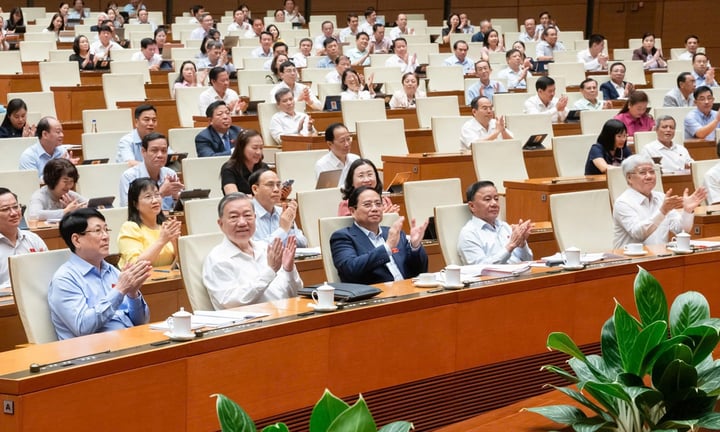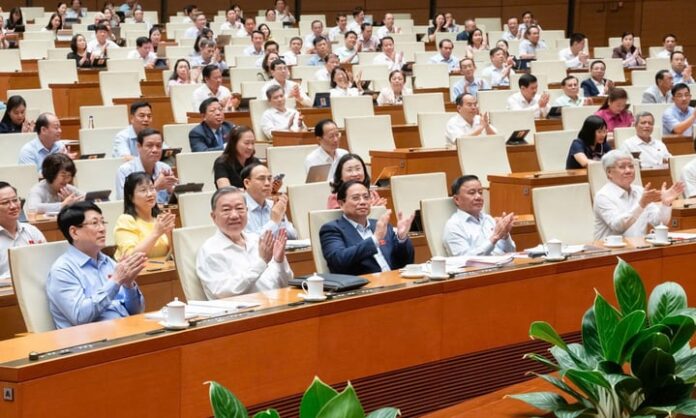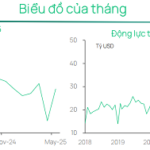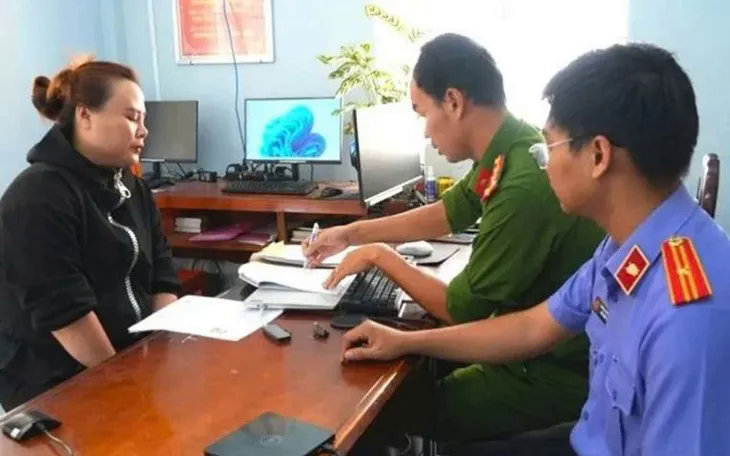On June 16th, with all 470 delegates present approving, the 15th National Assembly passed a resolution amending and supplementing several articles of the 2013 Constitution.
The resolution takes effect from the date of its adoption.

Leaders of the Party, State, and National Assembly delegates attend the morning session on June 16th.
New regulations on appointing provincial leaders after reorganization
The resolution amends Article 110 of the 2013 Constitution to stipulate that Vietnam’s administrative units shall be organized into two levels: provinces and centrally-controlled municipalities, and administrative units below the provincial level as prescribed by law.
Special administrative-economic units shall be established by the National Assembly. The establishment, dissolution, merger, division, and adjustment of administrative boundaries must take into account the opinions of the local people and follow the procedures prescribed by the National Assembly.
The resolution also stipulates the termination of the operations of district-level administrative units across the country from July 1st.
According to the resolution just passed by the National Assembly, when streamlining the apparatus of agencies after the administrative reorganization and ending the operations of district-level administrative units in 2025, the election of the positions of Chairman and Vice Chairman of the People’s Councils, heads of the People’s Council’s committees, Chairmen and Vice Chairmen of the People’s Committees in administrative units formed after reorganization shall not be held.
The resolution also states that there will be no election for the positions of head and deputy head of the National Assembly delegations of provinces and centrally-controlled municipalities formed after reorganization.
Instead, based on the announcement of the authorized personnel management agency, the Standing Committee of the National Assembly shall appoint the Chairman, Vice Chairman, and heads of the committees of the People’s Councils, as well as the head and deputy head of the National Assembly delegations of the provinces and centrally-controlled municipalities formed after reorganization.
The Prime Minister shall appoint the Chairman and Vice Chairman of the People’s Committees of the provinces and centrally-controlled municipalities formed after reorganization.
The Standing Committee of the Provincial/Municipal People’s Council shall appoint members of the Provincial/Municipal People’s Committee and appoint the Chairman, Vice Chairman, and members of the People’s Councils and People’s Committees of the lower-level administrative units formed after reorganization.
The Standing Committee of the People’s Council at the sub-provincial/municipal level formed after reorganization shall appoint members of the People’s Committee of the same level.
In special cases, the National Assembly shall decide to appoint personnel who are not delegates of the People’s Council to hold the positions of Chairman, Vice Chairman, and heads of the committees of the People’s Council in administrative units formed after reorganization, or to become delegates of the People’s Council to form a provisional People’s Council in wards implementing the urban governance model without organizing the People’s Council.
Amending and supplementing 5/120 articles and clauses of the Constitution
Earlier, when presenting the report on explanation, reception, and amendment of the draft resolution, Mr. Nguyen Khac Dinh, Vice Chairman of the National Assembly, emphasized that with 280,226,909 turns of opinions on all contents of the draft resolution, it showed the interest, consensus, and high sense of responsibility of all classes of people towards the country’s important tasks.
” Taking people’s opinions on amending and supplementing the Constitution has truly become a democratic and extensive political and legal activity in the whole political system and society,” said Mr. Nguyen Khac Dinh.
Initially, the Committee proposed to amend and supplement 8/120 articles and clauses of the 2013 Constitution, but after studying the very reasonable, logical, convincing opinions of agencies, organizations, people, experts, scientists, and National Assembly deputies, the Committee proposed to amend and supplement only 5/120 articles and clauses, and keep 3 articles unchanged according to the current Constitution.
The contents that remain unchanged are the provisions on taking people’s opinions on the establishment, dissolution, merger, division, and adjustment of administrative boundaries (Clause 3, Article 110); provisions on “local government” and “local government levels” (Articles 111, 112, and 114); and the right to question of the deputies to the People’s Council (Clause 2, Article 115).
At the same time, the Committee also received and amended all 5/5 articles and clauses proposed to be amended and supplemented in the Constitution, as well as the enforcement clause and the transitional clause in the draft resolution, ensuring consistency and uniformity in both content and expression techniques.
“ After the National Assembly passes the Resolution amending and supplementing a number of articles of the Constitution, and the Law on Organization of Local Government (amended) is passed by the National Assembly, the Standing Committee of the National Assembly will issue 34 resolutions on the reorganization of communal-level administrative units, together with Resolution No. 202/2025 of the National Assembly on the reorganization of provincial-level administrative units, which will provide a full, uniform, and consistent legal basis for all administrative units across the country to implement the two-level local government model, and the administrative units formed after reorganization will officially operate from July 1,” said Mr. Nguyen Khac Dinh.
Mr. Nguyen Khac Dinh affirmed that with a sense of urgency and responsibility, the Committee completed an extremely important task assigned by the National Assembly right from the first session of the 9th term.
The resolution amending and supplementing a number of articles of the Constitution of the Socialist Republic of Vietnam, passed by the National Assembly, will be a historical milestone and of great significance, marking the beginning of a profound institutional reform, reflecting a revolutionary mindset in organizing the political system and national governance.
“ This is also a constitutional basis for successfully implementing the Party and State’s policy on reorganizing and streamlining the apparatus of the political system, creating a foundation for building a strong and prosperous Vietnam, where people are happy and peaceful,” emphasized Mr. Nguyen Khac Dinh, Vice Chairman of the National Assembly.
“A Call for Passion: Truong Gia Binh on the Drive Needed to Succeed in Semiconductor Industry”
“Semiconductors are the staple food of the digital era, much like rice is to South Korea, and AI is the new strategic energy source, akin to oil in the future.”
“HDBank and PV Power Sign VND2,000 Billion Credit Limit Agreement: A Step Towards Sustainable Energy Transition.”
“Forging ahead with its commitment to green finance and sustainable development, on June 11, 2025, HDBank (HOSE: HDB), a prominent commercial bank in Vietnam, inked a significant credit agreement with PV Power, a foremost electricity producer under the umbrella of Petrovietnam. The agreement comprised a credit limit of VND 2,000 billion, marking a pivotal step in HDBank’s journey toward fostering environmentally conscious initiatives.”





















